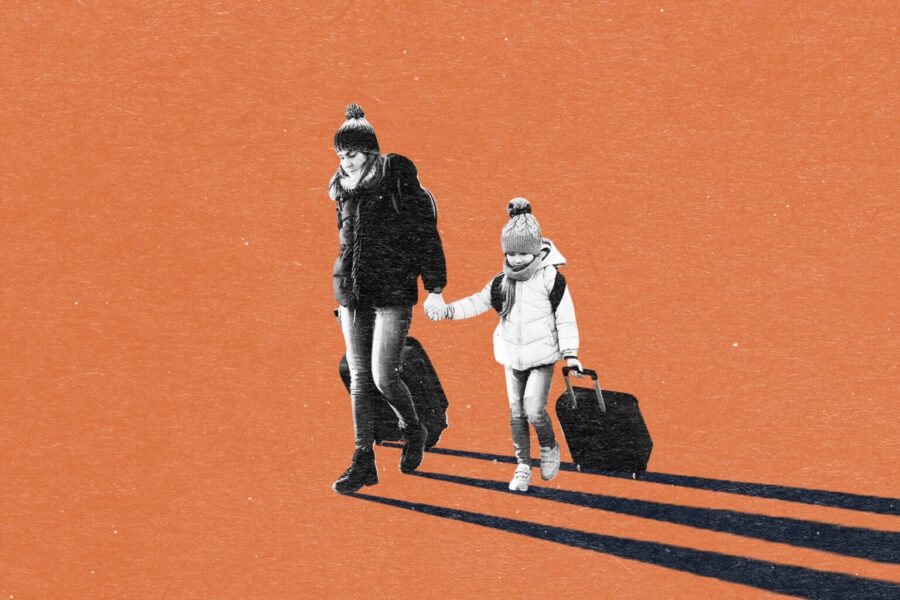Both women and refugees. And survivors and marginalized. From Afghanistan, Iran, Cameroon, Congo, Syria, Lebanon, Kuwait and Iraq. Women from Ukraine who have just arrived here, women from Nigeria who have been in Athens for over a decade.
Single mothers, alone, with a partner, divorced, with experiences of rape, domestic and other forms of gender-based violence. Women who are longing and intensely searching for a place to fit in. Bodies violated in their efforts to secure a job and a place to live.
Together with these women we build informal networks of mutual support, based on inclusivity. There, femininities are gathered with the goal of “together”, the ability of socially and culturally diverse individuals to harmoniously experience affection and closeness through hands-on care.
The groups bring together women from different countries, of different educational levels, different ages, with or without children, united by the desire to belong to something they will define, and by the impulse of a giving, within their random, coincidental encounter.
Through the creation of places and context, group members come together in terms of consent and share visions, dreams, desires and questions.
The goal of our meetings is to prevent gender-based violence, as well as to eliminate the risk of further re-traumatization of the survivors.
Women are empowered, they discover and explore ways to take care of themselves and protect each other, attempting to build networks of solidarity in which they can let go and feel safe.
Many of those who participate in Diotima Centre’s meetings and groups often experience stress and chronic anxiety concerning the impact of their everyday living conditions on their mental and physical health.
They are worried about the situation in the country, about the constant frustration of their goals and the constant overturn of their plans, about the lasting dependence on institutions and organisations, about the chronic lack of possibility to feed themselves and their children with what they want.
The lack of inclusive resources is always against their desire and will to reclaim their bodies and the domination of their lives. “I want to have a job, a house, and my own money. Until that happens, I will feel like I still don’t have a life. I am alive, but I don’t have a life,” says in the group S. from Somalia, who has been in Greece for twelve years and is a survivor of multiple forms of gender-based violence.
Many of the survivors share that they are re-traumatized so that they can survive and provide for their children.
A series of incidents of repeated exposure to experiences of violence are observed at the spatio-temporal point where integration is delayed and resources seem to diminish and, gradually, disappear. There hope diminishes, needs increase, energy reserves vanish, and vulnerability takes on its essential meaning.
In the dark apartments, the vast majority of them underground or on the ground floor – all at the back of blocks of flats, either without any windows or with some limited access to skylights – the boredom and despair that they experience anyway because of other conditions of everyday life and the traumatic experiences of the immediate past is intensified.
There, the pain for the loved ones they have left behind – in many cases including their children – and the unfulfilled desire, their longing for a better place, expands and overwhelms them. “I wake up every morning and I think I’m still in Iran. And to think that I left because I couldn’t bear to be there any longer and have no control over my life.
And yet here life moves so slowly that even now, after five years, every morning I need to remind myself by whispering ‘don’t stress, you are here, and everything will be fine’,” says P. from Iran.
In these apartments, where they often live with other women in a similar situation, they start every day their attempts to become independent and organise their lives differently. The priority for most of them is to find a job immediately.
A path that, as we know from many testimonies, often leads to further incidents of violence. “He asked me to look after his elderly mother. He told me that in return I could stay with them. I did it because I really wanted to leave the house I was in. During the time I stayed there he claimed and had complete control over my movements. He wanted to know where I was going and where I was at all times. When I was out of the house I had to send pictures as proof of where I was,” says R. from Lebanon.
Meanwhile, the obvious things in life continue. They get sick, get pregnant, give birth to their children, going in and out of public health facilities where, in the absence of interpretation, they try to understand what medical decisions are made and what kind of operations are performed on their bodies:
“I gave birth by caesarean section. I went into the operating room without explanation of what would happen. I never understood either. I was alone in the hospital. Without an interpreter and without anyone close to me. I had just come from Iran. My husband was violent, so he wasn’t there. But even if he was there… After I gave birth, I didn’t see my son for seven days. I asked to see him, but they didn’t understand what they were saying. Nobody paid any attention to me. It was a horrible experience,” shares S. from Iran.
As a breath away from all this, in the meeting places they set up and fill with their presence and zest, they create for each other moments of emotion, relief, encouragement and hope. “I read a book written by one of you, from Afghanistan, and I learned a lot. Don’t worry, the same things happen in Cameroon. That’s why I left too. I couldn’t do anything there. But now we’re here. And it’s better. We’re better. And we will fight from here, for ourselves and for those we left behind,” says T. from Cameroon.
In these moments they feel they become visible, at least to each other. And, somehow, their existence, compressed by limitations, shortages and political decisions, finds a way to blossom through the commonality that unites them and acts of care that prove to them that their forces are still there.
“I am sleepy, very sleepy. Last night, I didn’t sleep at all. I sat in the arms of my friend from Ukraine who could no longer bear the idea of her country being bombed. I remembered Afghanistan, the war, everything. We cried together. But I am well, happy, full,” says H.
*The details of the beneficiaries have been changed to protect their personal data and security.
**The project “Do the human right thing – We raise our Voice for Refugee Rights” is implemented by Activecitizensfund in Greece by the Hellenic Council for Refugees (GCR) and its partners, International Rescue Committee Hellas (IRC), Diotima Centre and Popaganda. The €13.5 million Activecitizensfund project is funded by Iceland, Liechtenstein and Norway and is part of the European Economic Area (EEA) funding mechanism for the period 2014 – 2021, known as EEA Grants. The project aims to strengthen and enhance the sustainability of civil society and to highlight its role in promoting democratic processes, enhancing citizens’ participation in public life and defending human rights. The Activecitizensfund program grant for Greece is managed jointly by the Bodossaki Foundation and SolidarityNow. Read more here: www.activecitizensfund.gr. The views expressed herein are the personal views of the author and do not necessarily reflect the views of the EEA Financial Mechanism or the Grant Manager of the Active citizens fund Program in Greece (Bodossaki Foundation in cooperation with SolidarityNow).





